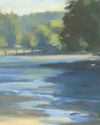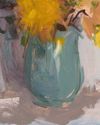
When Henri Matisse first visited Pierre-Auguste Renoir at his Les Collettes home outside Nice, he showed him some of his work. Renoir was a little taken aback by the younger artist’s style but told him that he thought he used black beautifully. The comment goes against the widely held belief that the Impressionists were somehow allergic to using black in their pastel-heavy paintings. Indeed, one need only look at works by Renoir, Monet and their contemporaries in order to see that they used a great deal of black paint, particularly in accents. The idea that pure black and white are taboo is a misconception.
In this masterclass, I consciously tried to use both extremes of tone to enhance and dramatise the colour of a still life, using pure Process Black and Titanium White not only as accents but also as part of the main colour scheme. Each picture you paint is unique and the process you follow always involves some unexpected decisions. As you will see from the later stages, my decision to incorporate such bold extremes came about through trial and error as well as calculated judgement. I find that the best paintings always arrive out of this combination. The object of the exercise was to make a very ordinary subject appear vivid and colourful. I hope to show you that the use of black and white as colours in themselves was crucial to the overall effect.
www.terenceclarke.co.uk
1. Establish a ground
Using a dilute mixture of Yellow Ochre and Vermilion Hue, I put a thin wash over the entire canvas to create a mid-tone ground. Doing this always helps me to judge the tonal values of mixes better from the beginning.
Diese Geschichte stammt aus der July 2020-Ausgabe von Artists & Illustrators.
Starten Sie Ihre 7-tägige kostenlose Testversion von Magzter GOLD, um auf Tausende kuratierte Premium-Storys sowie über 8.000 Zeitschriften und Zeitungen zuzugreifen.
Bereits Abonnent ? Anmelden
Diese Geschichte stammt aus der July 2020-Ausgabe von Artists & Illustrators.
Starten Sie Ihre 7-tägige kostenlose Testversion von Magzter GOLD, um auf Tausende kuratierte Premium-Storys sowie über 8.000 Zeitschriften und Zeitungen zuzugreifen.
Bereits Abonnent? Anmelden

Still life IN 3 HOURS
Former BP Portrait Award runner-up FELICIA FORTE guides you through a simple, structured approach to painting alla prima that tackles dark, average and light colours in turn

Movement in composition
Through an analysis of three masterworks, landscape painter and noted author MITCHELL ALBALA shows how you can animate landscape composition with movement

Shane Berkery
The Irish-Japanese artist talks to REBECCA BRADBURY about the innovative concepts and original colour combinations he brings to his figurative oil paintings from his Dublin garden studio

The Working Artist
Something old, something new... Our columnist LAURA BOSWELL has expert advice for balancing fresh ideas with completing half-finished work

Washes AND GLAZES
Art Academy’s ROB PEPPER introduces an in-depth guide to incorporating various techniques into your next masterpiece. Artwork by STAN MILLER, CHRIS ROBINSON and MICHELE ILLING

Hands
LAURA SMITH continues her new four-part series, which encourages you to draw elements of old master paintings, and this month’s focus is on capturing hands

Vincent van Gogh
To celebrate The Courtauld’s forthcoming landmark display of the troubled Dutch master’s self-portraits, STEVE PILL looks at the stories behind 10 of the most dramatic works on display

BRING THE drama
Join international watercolour maestro ALVARO CASTAGNET in London’s West End to paint a dramatic street scene

Serena Rowe
The Scottish painter tells STEVE PILL why time is precious, why emotional responses to colour are useful, and how she finds focus every day with the help of her studio wall

Bill Jacklin
Chatting over Zoom as he recovers from appendicitis, the Royal Academician tells STEVE PILL about classic scrapes in New York and his recent experiments with illustration